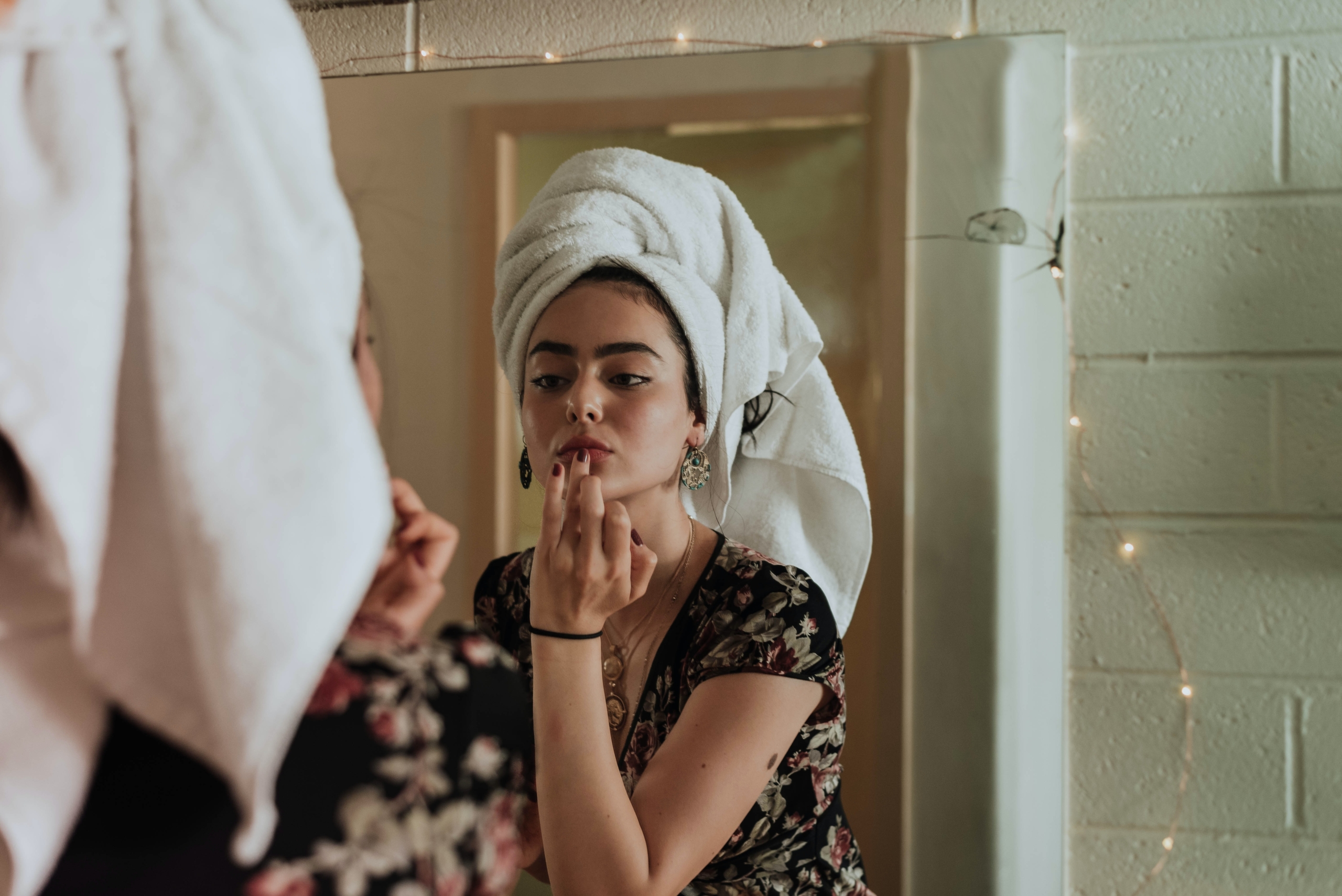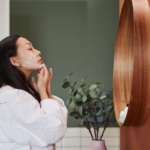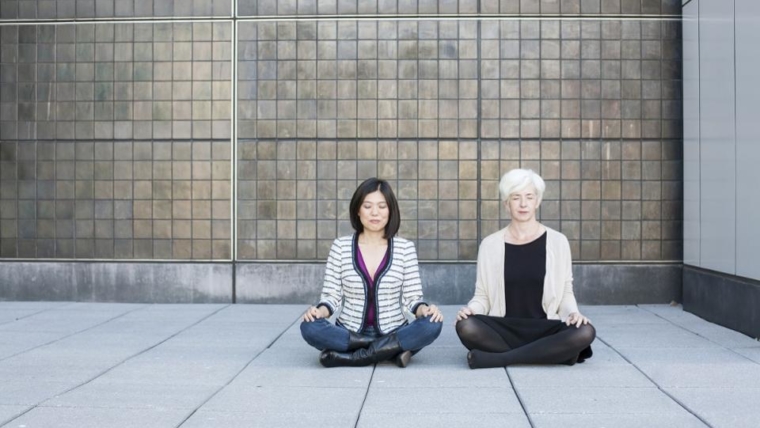
‘Skinimalism’ Is a TikTok Trend That Actually Makes Sense
These three steps may be all you need for healthy skin.
Fact checked by Nick Blackmer
Fast Facts
- Intricate skincare routines abound on social media and more products hit the shelves every day—but the key to healthy skin may be a pared down routine.
- Enter: “skinimalism”—the idea that, for many people, a simple skincare routine with as few as three steps is good, if not better than longer routines.
- A “skinimalist” routine might look like: cleanser, moisturizer, and sunscreen.
If you’ve ever felt confused about what constitutes a healthy skincare routine while watching social media influencers describe their intricate beauty regimens, or seeing compelling ads that promise wrinkle-free glowing skin, or even just staring at the wall of skincare products in your local pharmacy, you are not alone.
And with the emergence and apogee of the 10-step skincare routine in the past few years—which includes two types of cleansers, toner, serum, essence, skin mask, among other products—things became even more complicated.
Enter: “skinimalism,” a term that started to pop up in hashtags on TikTok and online forums around 2021. It’s a minimalist approach to skincare that suggests going back to the basics: cleansing, moisturizing and applying sunscreen.
The new trend is a breath of fresh air for those who felt unable to keep up with the increasingly elaborate, time-consuming, and often expensive multistep programs disseminated online.
Skincare Doesn’t Have to Be Complicated
In her three decades as a dermatologist, Fayne Frey, MD, has seen many patients struggle to figure out which products they should be using on their skin.
“The most important information on any skincare product is the ingredient list. But the average consumer doesn’t understand terms like cetyl alcohol, propylene glycol, and triethanolamine,” Dr. Frey told Health. “So, it’s a blind item, the consumer doesn’t really know what they’re buying.”
She has taken up as her mission to educate her patients and the public in general about the composition of skincare products, empowering them to make better choices and avoid being misled by marketing claims with no scientific evidence to support them.
In her recently published book, The Skincare Hoax, she defends that people who don’t have any inflammatory skin conditions, like acne or rosacea, actually don’t need much to maintain healthy skin.
“Among educated consumers, those who understand the nuances of cosmetics and drugs and valid science, I think many of them are heading towards minimalism,” said Dr. Frey. “Of course, I’m biased because people come to me because they already like my philosophy. But my particular patients and within my social circles, I think people are starting to use fewer products.”
So what exactly does a simplified, minimalist skincare routine look like? Here are the basics.
A ‘Skinimalist’ Routine: Cleanser, Moisturizer, Sunscreen
Cleansing
There are many types of cleansers available on the market. But, for people with healthy skin, plain water might be enough to keep their faces clean.
“We surveyed about 500 patients who came to our office but had no inflammatory skin issues. We found that about 50% of all women between 35 and 65 years of age never use a cleanser on their face. They wash with water only and their face is perfectly healthy,” said Dr. Frey. She happens to be one of those women.
Frey explained she could not find in the medical literature any evidence that suggests that people with healthy skin benefit from using a cleanser on the face, even if they wear makeup.
“Based on valid science, I cannot tell you that a woman has to use a cleanser on her face every day,” she said, highlighting that handwashing with soap and water has proven to be beneficial to prevent diseases, but the evidence is not there for face washing.
For those who like to use cleansers, she recommends soap-free options.
“Soap is a very effective cleanser made with animal fat and lye,” said Dr. Frey. “The problem is it has a very high pH, which washes away the lipids and fats that the skin uses to maintain its water content. So, it’s a harsh product.”
Many of the soap-free cleansers on the market contain labels that describe them as “gentle” and “mild” and have a pH similar to the skin, between five and six.
Moisturizing
“There’s plenty of science that shows that, when the skin has adequate hydration and it’s moisturized, it functions better,” said Dr. Frey, who added that the skin is a type of barrier to the outside world, protecting us from ultraviolet light and microorganisms—essentially performing an important immunology role.
When the skin is dry—and you can easily tell that’s the case when you see flakes and scales or feel itchy—it is very important to moisturize. But it’s not a mandatory step if you feel your skin is naturally hydrated on a given day.
“The need to moisturize could be seasonal, or only on certain parts of the body,” said Dr. Frey. She added that there are many well-formulated moisturizers on the market and she has had the chance to personally test the efficacy of many of them in her office with a device that measures the skin’s water content.
According to Dr. Frey, many products that claim to have an impact on the appearance of fine lines and wrinkles—like eye creams, night creams, and primers—are formulated pretty much like moisturizers.
“They help the skin retain its own moisture, and the water content goes up, which is great. So, the effect of that particular product has more to do with its ability to work as a moisturizer than anything else,” said Dr. Frey. “I’m not against an eye cream, it’s a good moisturizer. If you like it, go ahead, but you don’t need it. You can use your same facial moisturizer.”
Applying sunscreen
Frey says that the only skincare product on the market with a true anti-aging potential proven by scientific research is sunscreen.
In addition to preventing skin cancer, sunscreen also has an important impact on the skin’s appearance over the years.
A good example of the effects of sunscreen can be seen when comparing skin regularly exposed to the sun (think: neck, hands, and arms) to skin that is usually covered by sunscreen or clothes in people 40 years or older.
“You will see a very different tone and texture even though that skin is all the same age,” said Dr. Frey. “The overwhelming majority of pigmentation, wrinkling, blood vessel formation is due to the damaging effects of the sun’s ultraviolet rays.”
The effects can be seen in a 2021 commentary published in the Journal of the European Academy of Dermatology and Venereology, which shows the skin of a 92-year-old patient who UV-protective moisturizers on her face regularly, but neglected the skin on her neck.1 The photo from the commentary also went viral on Twitter.
Unnecessary Steps
For people with healthy skin, everything else on the market—including serums, essences and exfoliants—is not essential and there is limited scientific evidence that they work better than common moisturizers, according to Dr. Frey.
She added that science also suggests that a recipe for healthy, optimal skin parallels a healthy lifestyle, including a healthy diet, adequate sleep, drinking enough water, exercising and managing stress.
“People must realize they don’t need the overwhelming majority of products that are out there,” Frey says. “I think simple skincare regimens, consisting of sunscreen and moisturizer, are ideal. There’s no need to spend money on expensive products. There’s no correlation, and this is from objective testing, between how much you spend on a product and how well it works.”
Sources
- Posch C. Ageing research: rethinking primary prevention of skin cancer. J Eur Acad Dermatol Venereol. 2021;35(11):2216-2218. doi:10.1111/jdv.17660







